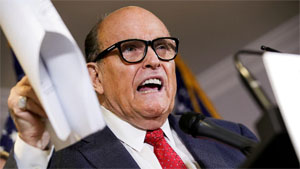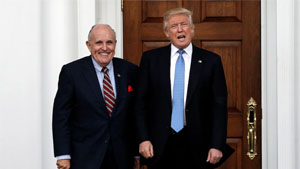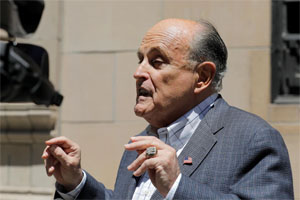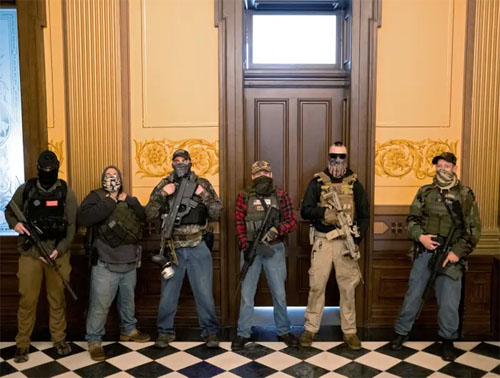MSNBC
Jul 2, 2021
-- REPORT ON THE NOVEMBER 2020 ELECTION IN MICHIGAN, by COMMITTEE MEMBERS Senator Edward McBroom – Chair Senator Lana Theis – Majority Vice Chair Senator Jeff Irwin – Minority Vice Chair Senator John Bizon, 6/23/21
It was 12 hours, or 15 hours, after McBroom’s report was published that Trump put out a press release publishing McBroom’s phone number, and accusing him of a “cover-up”. Those were his words.
****************************
Trump Calls McBroom's Michigan Election Report a 'Cover Up,' Asks Supporters to Call His Office
by Zoe Kalen Hill
Newsweek
6/24/21 AT 3:16 PM EDT
NOTICE: THIS WORK MAY BE PROTECTED BY COPYRIGHT
YOU ARE REQUIRED TO READ THE COPYRIGHT NOTICE AT THIS LINK BEFORE YOU READ THE FOLLOWING WORK, THAT IS AVAILABLE SOLELY FOR PRIVATE STUDY, SCHOLARSHIP OR RESEARCH PURSUANT TO 17 U.S.C. SECTION 107 AND 108. IN THE EVENT THAT THE LIBRARY DETERMINES THAT UNLAWFUL COPYING OF THIS WORK HAS OCCURRED, THE LIBRARY HAS THE RIGHT TO BLOCK THE I.P. ADDRESS AT WHICH THE UNLAWFUL COPYING APPEARED TO HAVE OCCURRED. THANK YOU FOR RESPECTING THE RIGHTS OF COPYRIGHT OWNERS.
Former President Donald Trump called Michigan State Senate's election investigation a "cover up" concerning the 2020 presidential election, and urged his supporters to contact two state senators and have them "do the right thing."
Since last November's contest, Trump continues to allege that fraud took place in the election that saw Joe Biden win, even though there has been no evidence to corroborate such a claim. Biden took Michigan with 16 electoral votes.
Trump's Save America PAC sent out an email with a statement from the former president. In the message, Trump called out two Republican Michigan state senators: Majority Leader Mike Shirkey and Ed McBroom.
"Michigan State Senators Mike Shirkey and Ed McBroom are doing everything possible to stop voter audits in order to hide the truth about November 3rd," Trump's statement began.
"The Senate 'investigation' of the election is a cover up, and a method of getting out of a Forensic Audit for the examination of the Presidential contest."
Trump referenced Michigan's Senate Oversight Committee report on the November 2020 general election, which was released Wednesday night, in his statement. He implied that the report's findings warranted a forensic audit.
"Instead of doing a Forensic Audit, they want to investigate the Patriots who have fought for the truth and who are exposing a very possibly Rigged Election. The truth will come out and RINO's will pay at the polls, especially with primary voters and expected challenges," he wrote.
In the statement, Trump also referred to the city of Detroit as the "most corrupt election city in the U.S.," and alleged that "corrupt" politicians are wrong in saying Michigan had no voter fraud.
McBroom, who lead the investigation into the 2020 election, said that the committee investigated every major concern including dead people voting and issues with a voting center in Detroit.
"People are, understandably, confused by recent changes to election laws, as well as by practices, orders and determinations made by state and local governments in response to the pandemic. They are right to demand answers and deserve nothing less than the truth amidst so much shouting and misrepresentation from both sides of the political spectrum," McBroom said in a statement about the report.
"This investigation was lengthy, thorough, and revealing. We found both real vulnerabilities and resiliency within the state's elections system. We also discovered the extent to which our elections officials go to facilitate them," he also said.
"After innumerable hours over many months, watching, listening, and reading both in-person testimony and various other accounts, I am confident in asserting that the results of the November 2020 General Election in Michigan were accurately represented by the certified and audited results."
Meanwhile, the former president called on his supporters to take action and listed the apparent office numbers for both senators at the end of the released statement.
"Our County was based on free and fair elections and that's what we must have!" Trump concluded. "Call those two senators now and get them to do the right thing, or vote them the hell out of office.
Newsweek reached out to McBroom and Shirkey for comment.




